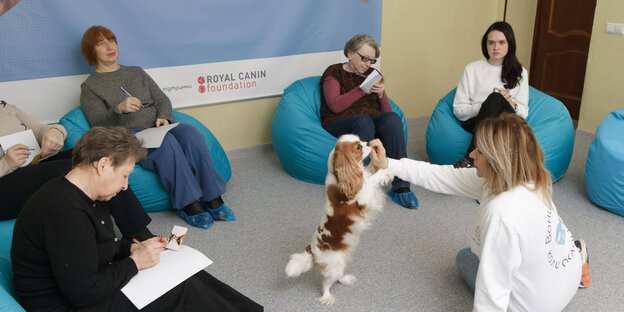The Russian war is causing psychological problems for many people in Ukraine. A therapy center in kyiv now uses dogs for healing.

Therapy session at the Inniko aid organization in the capital kyiv Photo: IMAGO/Kirill Chubotin
Kyiv taz | Barça seems delighted. The six-month-old male sniffs everyone sitting on the carpet in the room, drops to the floor and rolls from side to side. But after just a few minutes he decides it would be best to lie down on Lisanna's lap and let her scratch him.
Lisanna is 20 years old and has been going to psychotherapy with dogs in kyiv since last fall. “It helps me solve my problems,” she says. Furthermore, when she was little she always had dogs or cats around her. She misses the animals now, she says. She agreed to be observed during a therapy session and talk about it. Lisanna has a lot to discuss with her therapist.
He has already had to flee twice: in 2014 from his hometown of Donetsk, when Russian-controlled militias seized power there and began fighting the Ukrainian army. She was ten years old then. In the following years she lived in Mariupol, the second largest city in the region. And only about 15 kilometers from the so-called line of contact, as the front was called at that time when everything was relatively calm.
But he also had to flee Mariupol when the Russian army attacked the city two years ago. Furthermore, her parents died early and she grew up most of the time with an aunt who also had mental problems.
Two years of training
An aid organization called Innikos in kyiv offers help to people like Lisanna. “The name simply comes from the first letters of the names of our first three dogs,” explains Maryna Prokopenko. She is a trained dog trainer and runs a dog therapy center in the capital of Ukraine.
Innikos started working in October last year. Currently, two psychologists and five dog trainers work with six dogs. Prokopenko and his colleagues are currently training two more dogs. That takes one or two years. In the end, everyone obtains an internationally recognized certificate.
One of the dogs in training is Barça. “He's a Belgian shepherd and he's still very playful,” says Maryna Prokopenko. “But he has good character.” In principle, it is easier to work with slightly older dogs. With them it is easier to see if and how they are suitable for therapy.
Around 120 individual and 24 group sessions are held each month at the therapy center. The offer is free for patients. It is aimed at both civilians and soldiers without age restrictions. It is funded by the French Royal Canin Foundation. Innikos has now moved to its own facilities in the Obolon district of northern kyiv.
Advice and care of children.
The first therapy sessions took place last fall at the Mariupol Center in the city center. These are the halls of a non-profit foundation founded by the city of Mariupol. There, internally displaced people from Mariupol, which was destroyed and occupied by Russia, are helped to settle in their new place of residence. These centers exist in practically all major cities west of the Dnieper. In addition to extensive advice, the offer also includes short-term childcare.
These offers are also available at the new location. And that can be seen in the room where Lisanna's therapy session is taking place that day. There are brightly colored toys and stuffed animals for preschoolers and even a small playhouse. Therapy dog Nika inspects him and then performs some tricks. The dog listens to every word, paws well and looks up. Patient Lisanna is smiling from ear to ear and rewards Nika with a dog treat.
Psychologist Anna Chasovnikova is Lisanna's therapist. “We've already had 20 sessions together,” she says. The dogs must support her work. “By petting the dogs, patients' stressed souls can relax.” Being close to the dog can comfort and relieve anxiety. Blood pressure and pulse rate decrease.
“Dogs open doors,” says Chasovnikova, citing the example of a patient who could not name his own problems. “He always said that nothing was wrong with him.” After a few minutes with the dog, she was finally able to cry and found it very liberating.
a little distraction
Some patients find it easier to say something to their dog than to another person. “A dog has no expectations and does not give advice.” In addition, dealing with the dog helps people distract themselves from their worries for a short time.
She has been working as a psychotherapist for 16 years, says Chasovnikova. Working with dogs is still quite new for her, but she already values it a lot. The therapist may also feel special empathy for Lisanna. She also had to flee twice: in 2014 and 2022.
Dogs are as individual as people. “Not everyone suits everyone,” explains Daria Reznichenko. She is a dog trainer and responsible for the Innikos organization. “We have preliminary conversations with patients to find out which dog is best suited.” Some patients just need an animal to hug. “Then we need a calm dog. Others need a more active animal so they can move around a bit.” Of course, therapy is not right for everyone. For example, not if someone is afraid of dogs or is allergic to dog hair.
In reality, therapy is about human patients. But animals also benefit. Therapy dog Chelsea lies on the mat and snuggles against Reznichenko's leg. She “lived on the streets and then in an animal shelter for two years.” Chelsea is more of an affectionate dog: very calm and immediately affectionate with strangers.
The demand is great. That's why new dogs are trained. The goal is to provide qualified help to people facing psychological problems and trauma after the start of the large-scale Russian invasion. Currently, Innikos plans to open two new locations in other cities in Ukraine.